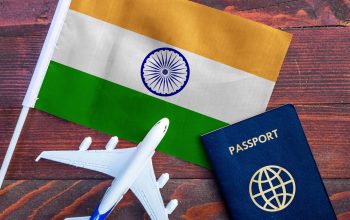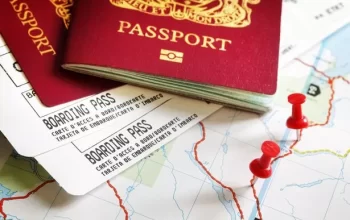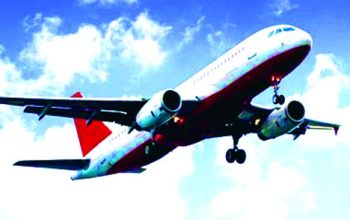Are you planning a trip to India and wondering about the eVisa process? Look no further than our ultimate guide to Indian eVisa airports! We’ve got all the information you need to know, from which airports accept eVisas to tips for making your entry into India as smooth as possible. Don’t let confusing visa regulations hold you back – read on for everything you need to know before your next adventure in India.
Introduction to Indian eVisa Airports
If you’re planning to travel to India, you’ll need to apply for an eVisa. The process is simple and can be done entirely online. However, there are a few things you need to know before you apply, including which airports offer eVisa services. Indian eVisa Airports
In this article, we’ll give you a complete guide to Indian eVisa airports. We’ll cover everything from which airports offer the service to what documents you need to have in order to apply. By the end of this article, you’ll be fully prepared to apply for your Indian eVisa.
What is an Indian eVisa?
An Indian eVisa is an electronic visa that allows eligible foreign nationals to enter and travel within India for business, tourism, or medical purposes. The eVisa program was launched in 2014 and has since become the primary method of applying for a visa to India.
To apply for an Indian eVisa, applicants must first complete an online application form and submit it along with any required supporting documents. Once the application is approved, applicants will receive their eVisa via email. The eVisa must be presented at the time of entry into India and is valid for a maximum stay of 60 days.
Indian eVisas are available to citizens of over 160 countries, including the United States, Canada, Australia, and the United Kingdom. For a complete list of eligible countries, please visit the official website of the Government of India.
Types of Indian Visas and Who Can Apply for Them
There are several types of visas that allow foreigners to enter India for different purposes. The most common type of visa is the business visa, which allows its holder to conduct business activities in India. Other types of visas include student visas, tourist visas, work visas, and medical visas.
Who can apply for an Indian visa?
Most foreigners who wish to enter India need to obtain a visa before they travel. However, there are some exceptions. Citizens of Bhutan and Nepal do not need a visa to enter India, and citizens of Maldives can obtain a visa on arrival. In addition, citizens of some countries may be eligible for an e-Visa, which allows them to apply for a visa online and receive it electronically. Indian Visa requirements
Eligibility Requirements for the Different Types of Visas
There are different types of visas available for Indian citizens depending on their purpose of travel. For business travel, there is the Business Visa, for medical treatment, there is the Medical Visa, and for tourism, there is the Tourist Visa.
The eligibility requirements for each type of visa vary, so it is important to check with the Indian consulate or embassy in your home country before applying. For instance, the Business Visa requires that applicants have an invitation from a company or organization in India, while the Tourist Visa requires a valid passport and proof of onward travel.
Once you have determined which type of visa is right for your trip, you can begin the application process. The first step is to fill out an online application form on the website of the Indian consulate or embassy in your home country. After completing the form, you will need to submit it along with any required documents. These may include your passport, photos, and proof of onward travel. Once your application has been reviewed and approved, you will be issued a visa that will allow you to enter India.
Documents Required for Applying for the eVisa
If you’re planning to travel to India, you’ll need to apply for an eVisa before your trip. The process is simple and can be done entirely online. However, there are a few documents you’ll need to have in order to complete the application.
First, you’ll need a valid passport with at least six months of remaining validity and two blank pages. Make sure your passport has been issued within the last 10 years. Next, you’ll need a recent passport-sized photograph that meets all the requirements specified on the Indian eVisa website.
You’ll also need a credit or debit card to pay the visa fee, as well as an email address where you can receive your visa confirmation. Once you have all of these documents, you’re ready to begin the online application process.
Processing Time for the eVisa Application
The processing time for the eVisa application is typically between 24 and 72 hours. However, it is important to note that the processing time may vary depending on the applicant’s country of citizenship and the time of year. For example, citizens of the United States and Canada may experience longer processing times during peak travel seasons.
How to Apply for an Indian eVisa
If you are looking to travel to India, you will need to apply for an Indian eVisa. The process is relatively simple and can be done entirely online. In this article, we will outline the steps you need to take in order to apply for an Indian eVisa.
First, you will need to gather the required documents. These include a passport that is valid for at least six months from your date of arrival in India, a recent passport-sized photograph, and proof of onward travel out of India.
Next, you will need to fill out the online application form. Be sure to answer all questions truthfully and accurately. Once you have completed the form, you will need to pay the visa fee using a credit or debit card.
Once your application and payment have been processed, you will receive an email confirming your visa approval. Print out this email and bring it with you when you travel to India. You will also need to present your passport and photograph upon arrival in India.
And that’s it! Following these steps will ensure that you obtain your Indian eVisa quickly and easily.



